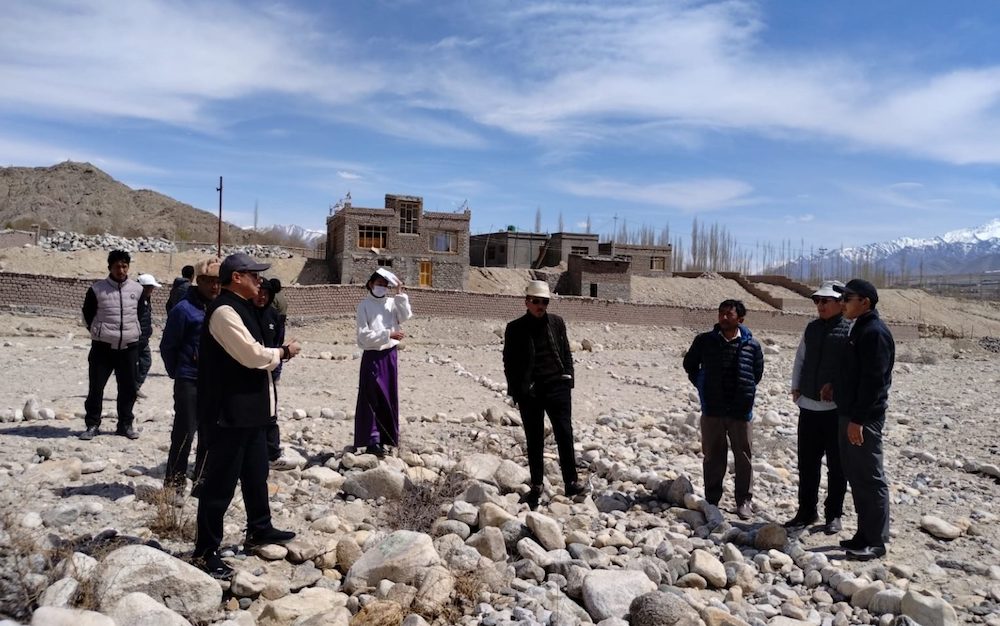Founder of the Tibetan Jewish Youth Exchange program aims to `share the secret of Jewish survival in exile’
By Charlotte Halle
Six of the counselors on Zionist youth movement summer camps in Britain this year will be Tibetans. Hailing from Dharamsala, Northern India, where the Tibetan government-in-exile is headquartered, the Tibetans will participate in the camps with the goal of developing their leadership skills, as part of the Tibetan Jewish Youth Exchange (TJYE) program, which was founded in 2000.
Inspired by the Zionist youth movement model, the young Tibetans are in the process of establishing their own youth movement while in exile from their homeland, which has been under Chinese rule since 1949.
“The project draws on the Jewish concepts of `Tikkun Olam’ [Repair of the World] and being a `Light unto the Nations,'” says the founder of the scheme, 28-year-old Kalela Lancaster, who is studying in the master’s program at the Hebrew University of Jerusalem. “It involves us reaching into our collective experience to connect with and support another people.”
Five years ago, Lancaster, who grew up in Liverpool, spent several months traveling in India. After arriving in Dharamsala – intending a short stay – she “fell in love with the place” and stayed to volunteer at a new, Israeli-initiaited museum which documents the tragedies of the Tibetan people.
During her four-month stay there, Lancaster participated in a seven-day march to commemorate the Tibetan uprising in 1959, an experience she says not only moved her deeply, but also reminded her of the powerful atmosphere created at the Jewish summer camps she had attended as a teenager in the Orthodox Zionist youth movement Bnei Akiva. “During the march, I saw how transformed these young people were when they had an outlet for their passion, for their country and their identity and how eager they were to take on leadership roles,” she recalled last week in a Jerusalem caf?. “The idea suddenly came to me. I thought maybe we could give the young Tibetans a chance to come and see the youth movement structures that exist in the Jewish community; some kind of exchange.”
Lancaster says that leaders in the Tibetan community were open to hear her ideas, in part because they had been concerned for some time that their youth were being led astray, assimilating and losing touch with their Tibetan Buddhist culture, frustrated by the lack of a political solution to their refugee status. A few were turning to drugs and alcohol.
The welfare officer of the Tibetan government-in-exile lent Lancaster a computer to write up a proposal for the project, while she asked young Tibetans to write essays on Tibetan identity in exile. “I wanted to see on paper how passionately they felt about who they are and how that was affected by being in exile,” she says.
Lancaster is not the first to draw links between Tibetan and Jewish experiences. Back in 1990, a group of mostly American Jews met with the Dalai Lama, the Tibetan political and spiritual leader, who called on them to share the secret of Jewish survival in exile. “I was trying to respond to this call in a practical way,” says Lancaster. “Some of the `secrets’ of Jewish survival are not transferable, like Shabbat, kashrut (Jewish dietary laws) and other religious rituals, but the educational aspect is.”
Taking her proposal to the Tibetan secretary of education – who had previously visited Jewish schools in the United States following an invitation from writer Blu Greenberg, who had been part of the 1990 delegation – Lancaster reports that “he really understood what I was getting at, and straight away wrote a letter of endorsement.” On her return to the UK, Lancaster found support for the idea of an exchange, but also a few cynics. Based in London, she set about forming a committee to pursue the idea – which drew several graduates of Zionist youth movements – and brought in members of the 300-strong Tibetan community in the UK. She also secured funding from the UK Jewish Aid and International Development charity to pay for a return trip to Dharamsala to pilot some activities.
Back in India, Lancaster recalls trying to explain informal education techniques – such as using games as an educational tool – to some rather bemused Tibetans: “They just didn’t get it. You can’t explain informal education, you have to experience it.” Assisted by a bunch of Israelis with youth movement experience whom she had found in a local caf?, Lancaster sought to try out informal education techniques with a group of Tibetans, some of whom would later become youth leaders. Together, they built an educational program with themes of tradition and modernity, interdependence and the five principles of Buddhist ideology, which they ran for pupils from a local Tibetan school (which teaches partly in English). “The atmosphere was incredible. They really responded,” she says. “In the Jewish community, this stuff is old hat, but for them it was so new. At the end they sang traditional Tibetan folk songs; it was just like camp.”
When four British youth leaders, including Lancaster, traveled to India to help run a residential summer camp, they were invited to meet with the Dalai Lama, where they received his blessing for the project. By this stage, the young Tibetans had given their movement a name, “Longsho,” which means “Arise” in Tibetan.
The next step was to bring a group of Tibetans to the UK in the summer of 2001, to enable them to see Zionist youth movement structures in action. A group of five flew to London to participate in an intensive training scheme, before attending summer camps run by the Reform youth movement, RSY Netzer, the Conservative youth movement, Noam, and the Federation of Zionist Youth. “It was pretty intense for them,” says Lancaster. “It was their first time in the West, which was a real culture shock, let alone being intensively with 100 spoilt raucous Jewish kids!”
Youth worker for the Reform movement, Rebecca Kay – who was in Israel last week on a solidarity trip – was at one of the camps. “The theme was freedom and slavery through the Exodus story,” she explains. “We looked at modern day issues that relate to freedom and our responsibilities. Having the Tibetans on camp really brought the theme to life. We were slaves in Egypt, why should we remember that? The answer was there in front of us. It was a very powerful experience for the camp.”
The trip was repeated last summer, and six more Tibetans are set to arrive in the UK next week to attend summer camps. Two other Zionist youth movements are now involved too: ULPSNYC-Netzer and Habonim Dror. In Tibet, Longsho is continuing to run biannual residential camps for youth and a new program is also in place to send experienced British youth movement graduates to Dharamsala for six months to help the Longsho leaders build an infrastructure for the movement.
Lancaster, who immigrated to Israel a year ago, passed over the leadership reins to volunteers from youth movements in London and now works as a fundraiser for the Public Committee Against Torture in Israel, as well as studying. She emphasizes that British Jewry has much to gain from the exchange. “While our structures and frameworks for Jewish youth are much more developed, it says a lot about the Tibetan community that they were prepared to take seriously a 25-year-old with no experience and a crazy idea. There’s a lot the Jewish community could learn from that. Our survival is to do with being contained and inward-looking, but the Tibetans are requesting us to come out and share in their struggle. That doesn’t mean confusing our own identity, in fact the opposite. It opens the eyes of [Jewish youth] to global issues and social consciousness.”
Lancaster says she did encounter some resistance to the exchange: “There was a certain note of `That’s nice, but we have to look after our own community first.’ And some of the movements were wary of having a non-Jewish presence for two weeks on camp.”
One question the Tibetans did ask, she reports, was why hadn’t Diaspora Jews returned to their homeland, now that it was possible. “But I think they understood the power of the comforts of the West,” she says, adding that in addition to connecting to the concept of exile and return in Jewish history, the Tibetans also drew some parallels between their own experiences and the Palestinian struggle for self-determination. “I think there’s a message for us in there somewhere,” she says.









